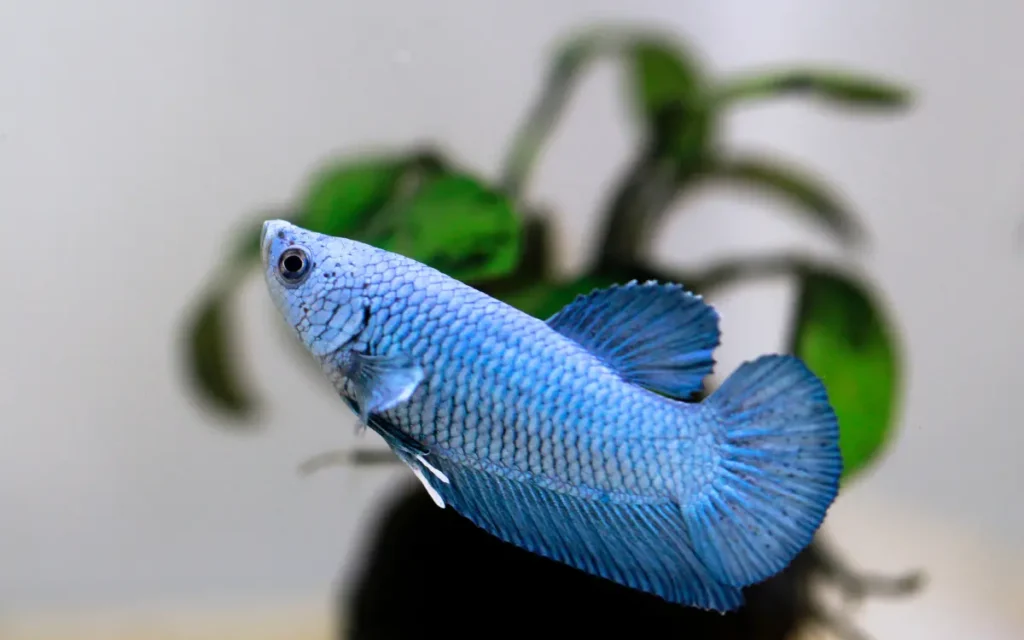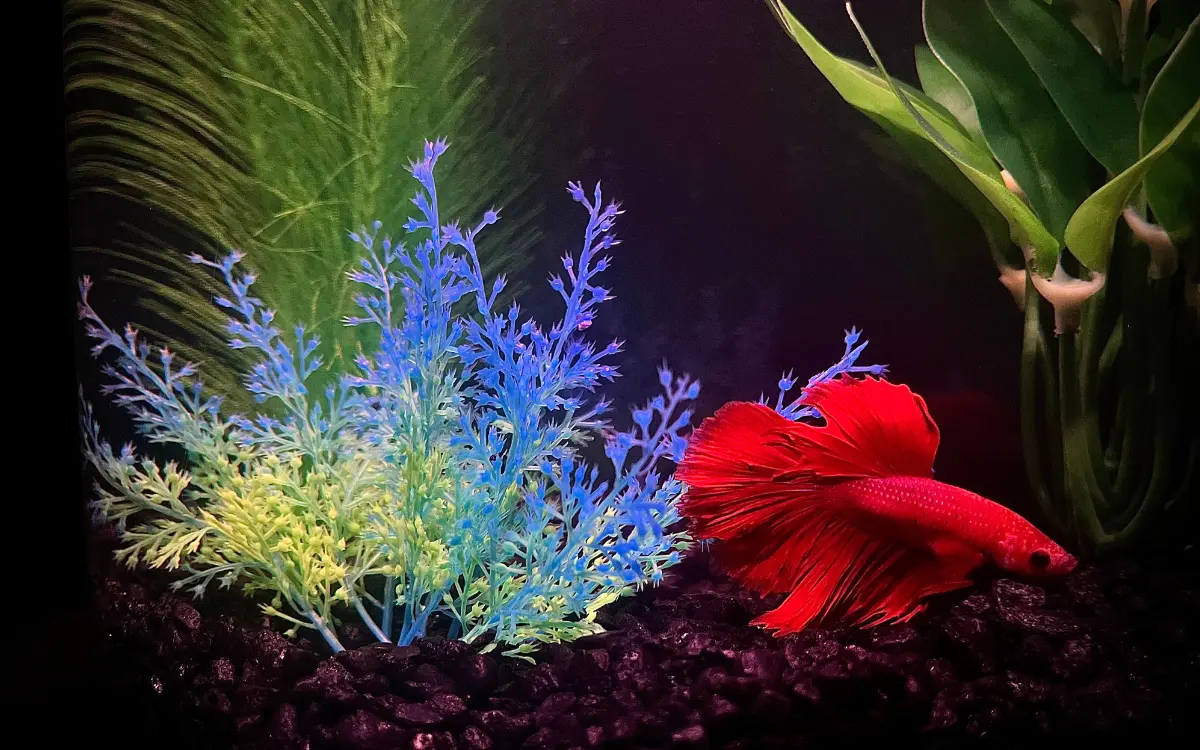Betta fish may refuse food for several reasons, ranging from environmental issues to health problems. A loss of appetite can signal various underlying factors, such as poor water quality, low temperatures, stress, or illness.
Identifying and addressing the root cause is essential to ensure your Betta returns to a healthy eating routine.
Environmental Factors
Water Quality: Poor water conditions can cause stress, leading Bettas to lose their appetite. It’s crucial to maintain clean water through regular water changes and proper filtration to keep toxins like ammonia and nitrates low. This ensures a healthy environment that encourages eating.
Water Temperature: Bettas are tropical fish and need warm water, ideally between 76-82°F. If the water is too cold, it can slow their metabolism, making them less inclined to eat. Keeping the tank at a consistent, appropriate temperature helps support their appetite and overall health.
New Tank or Environment Changes: Stress from moving to a new tank, changes in decor, or unfamiliar surroundings can cause a Betta to stop eating temporarily.
When making adjustments, try to minimize changes and provide hiding spots to help them feel secure. Allowing time to acclimate can restore their comfort and appetite.
Health-Related Issues
Illness and Disease: Common ailments like ich, fin rot, and swim bladder disorder can lead to a loss of appetite in Betta fish. Watch for symptoms such as white spots on the body (ich), frayed or discolored fins (fin rot), or difficulty swimming (swim bladder disorder).
If you notice any of these signs, it’s essential to begin appropriate treatments, such as isolating the fish and using medications designed for these conditions.
Parasites and Infections: Internal parasites or bacterial infections can also prevent Bettas from eating. Signs of parasitic infection include bloating, visible white spots, stringy feces, or erratic swimming behavior.
If you observe these symptoms, consider seeking treatment options, like anti-parasitic medications, and possibly consulting a veterinarian.
Injury: Physical injuries, such as damage to the fins or mouth, can make it painful for Bettas to eat. Injuries may occur from sharp tank decor, rough handling, or aggressive tank mates.
Look for signs like clamped fins, swollen areas, or a reluctance to approach food. To aid recovery, remove any sharp objects, ensure the tank is peaceful, and monitor the Betta’s condition closely.
Diet and Feeding Issues

Food Type and Quality: Bettas may reject food that is low quality or doesn’t meet their dietary needs. It’s essential to offer a high-quality, protein-rich diet that mimics their natural food, such as insects and small invertebrates. Opt for Betta-specific pellets or flakes and supplement with live or frozen treats like bloodworms or brine shrimp.
Overfeeding and Picky Eating: Feeding Bettas the same type of food repeatedly can lead to picky eating habits. To keep their diet interesting and stimulate their appetite, vary their meals with live, frozen, or freeze-dried foods. This variety helps prevent boredom and ensures they receive balanced nutrition.
Spoiled or Unsuitable Food: Bettas may avoid eating if the food has expired or spoiled. Always check for freshness, and store food in a cool, dry place. Feed them small portions appropriate for their size, removing any uneaten food to maintain water quality and prevent waste buildup.
Behavioral and Psychological Factors
Stress: Bettas are highly sensitive to stress, which can result from aggressive tank mates, frequent tank disturbances, or overcrowding. Stress often causes a decrease in appetite and can impact their overall health. To create a calm environment, house Bettas alone or with compatible, peaceful tank mates, reduce sudden movements or loud noises around the tank, and ensure they have ample space to swim freely.
Boredom and Lack of Stimulation: Without environmental enrichment, Bettas may become bored, leading to a reduced interest in food. To keep them engaged, add live plants, floating toys, or small decorations to encourage exploration. Rearranging tank decor occasionally can also provide novelty and help stimulate their natural curiosity.
Seasonal and Natural Appetite Changes: Bettas may eat less during certain periods due to seasonal changes or natural fasting behaviors. For example, during cooler seasons, a slight temperature drop might slow their metabolism, leading to temporary appetite loss. These fluctuations are normal, but maintaining a stable water temperature can help minimize seasonal effects on their appetite.
Read also: What is the proper ph for betta fish?
What to Do if Your Betta Fish Isn’t Eating?
Observe for Other Symptoms: Monitor your Betta’s behavior for signs of illness or injury, such as clamped fins, unusual swimming patterns, or visible spots, which may indicate health issues requiring treatment.
Check and Adjust Water Conditions: Ensure the tank’s water is clean, warm (76-82°F), and properly filtered. Regular water changes and stable temperatures are crucial for supporting a Betta’s appetite.
Offer Variety: Try offering different food types, like live, frozen, or freeze-dried treats, to entice your Betta. Varying their diet can rekindle their interest in eating.
Minimize Stressors: Remove any aggressive tank mates, and reduce loud noises or bright lights around the tank to create a calm environment that encourages eating.
Seek Professional Help: If your Betta continues to refuse food for more than a few days, consider consulting a veterinarian or experienced aquarist for further advice and potential treatment options.
Conclusion
A Betta fish’s lack of appetite can stem from various factors, including environmental conditions, health issues, dietary preferences, and stress. By carefully observing your Betta and addressing any potential concerns—such as adjusting water quality, offering a varied diet, and reducing stressors—you can help restore their appetite. If the issue continues, seeking professional advice ensures your Betta returns to a healthy and happy eating routine, promoting their overall well-being and enjoyment of life in their tank.

